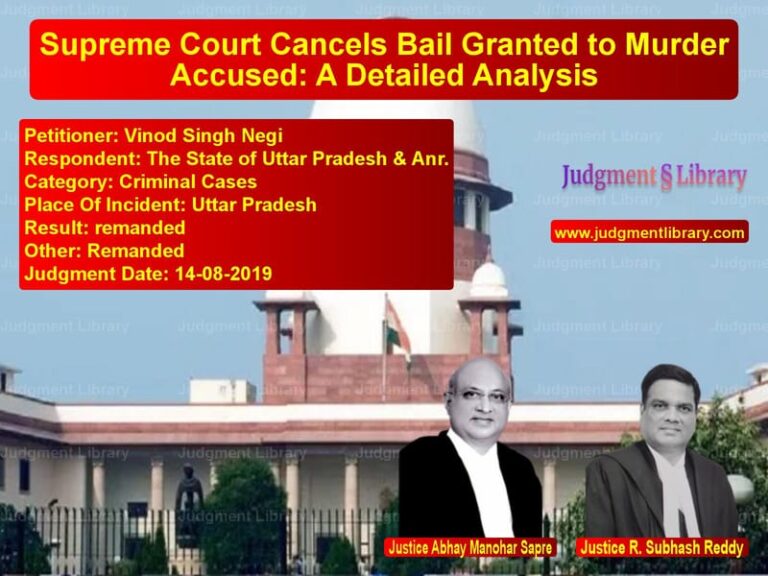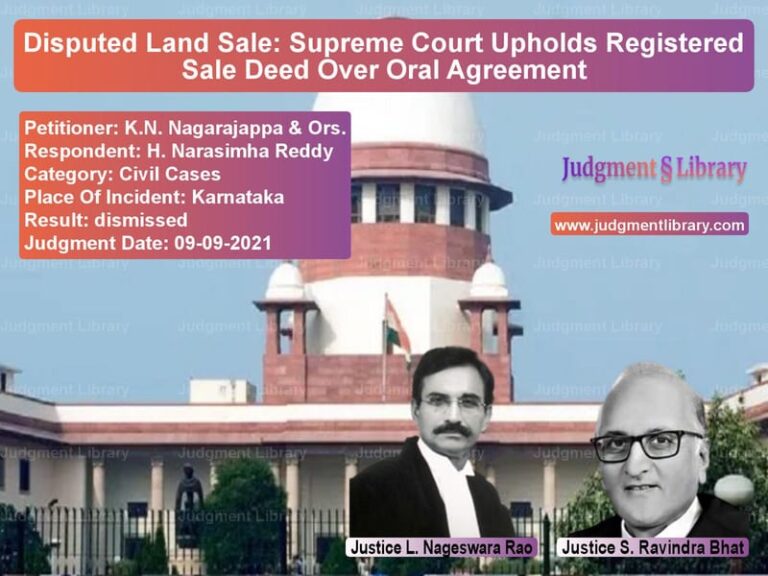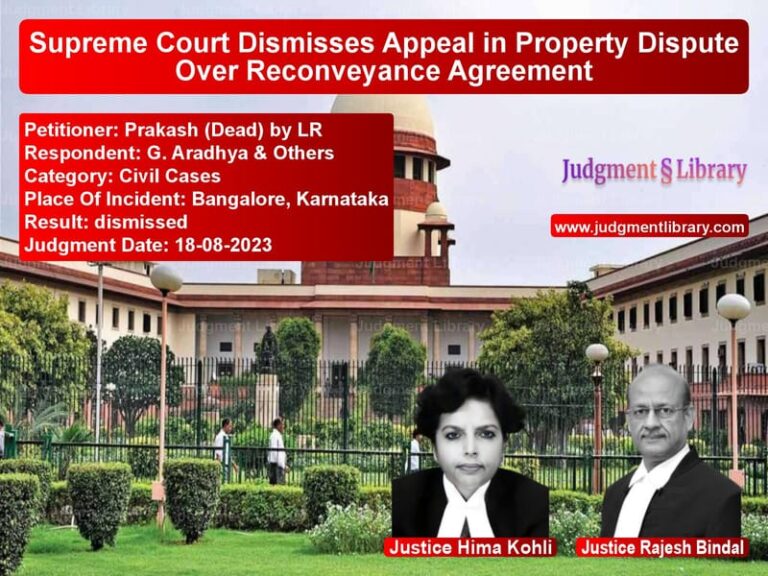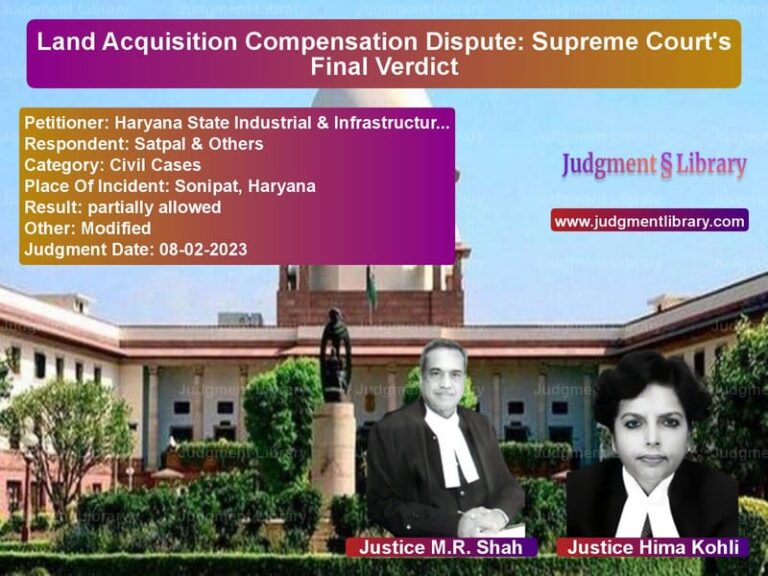Supreme Court Rules on Mining Rights and Land Reservation in Karnataka
The case of M/s. Geomysore Services (I) Pvt. Ltd. & Anr. vs. M/s. Hutti Goldmines Co. Ltd. & Ors. revolves around the legal framework for mining rights, particularly the power of the Central Government in approving land reservations for state-owned mining corporations under the Mines and Minerals (Development and Regulations) Act, 1957 (the Act). The Supreme Court had to determine whether the Karnataka government’s decision to reserve land exclusively for a state-run company was justified.
Background of the Case
In Karnataka, several gold mines, including the Hutti Gold Mines, have been subject to legal disputes regarding the right to explore and mine resources. The appellants, Geomysore Services (I) Pvt. Ltd. and Deccan Gold Exploration Services Pvt. Ltd., were private mining companies that had been granted Reconnaissance Permits (RP) in 2000 and 2003, respectively, to explore gold deposits. Based on their findings, both companies applied for Prospecting Licences (PL) under Section 11(1) of the Act.
However, Hutti Gold Mines Ltd. (HGML), a state-owned company, did not initially apply for reconnaissance permits but later sought reservation of the land for itself under Section 17A(2) of the Act, which allows state governments to reserve land for mining by government-owned companies.
Legal Proceedings
1. Karnataka Government’s Request for Land Reservation
On November 28, 2006, HGML wrote to the Karnataka government, requesting that a large portion of land in the Hutti Gold Mines region be reserved exclusively for public sector mining. In response, the Karnataka government wrote to the Central Government on December 27, 2008, requesting approval to reserve 161 sq. km of land for HGML.
2. Opposition from Geomysore and Deccan
Geomysore and Deccan, having already invested in reconnaissance, opposed the reservation, arguing that they had a preferential right to prospecting licences. The Central Government initially upheld their objections, rejecting the Karnataka government’s request for reservation and directing that their PL applications be considered.
3. Karnataka High Court’s Ruling
Unhappy with the rejection, HGML challenged the decision in the Karnataka High Court. The High Court ruled in favor of HGML, stating that under Section 17A(2), the State Government had the power to reserve land, and the Central Government had erred in rejecting the request.
4. Supreme Court’s Final Judgment
The matter reached the Supreme Court, which had to decide on several key legal issues.
Supreme Court’s Observations
1. Powers of the Central Government Under Section 17A(2)
The Supreme Court analyzed whether the Karnataka government had the unilateral power to reserve land or whether the Central Government had discretion in approving such requests. The Court held:
“The State Government can propose land reservation for public sector mining, but it cannot do so without the explicit approval of the Central Government.”
2. Preferential Rights of Reconnaissance Permit Holders
Geomysore and Deccan argued that since they had conducted extensive reconnaissance, they had a legitimate expectation of being granted prospecting licenses. The Court noted:
“Under Section 11(1) of the Act, reconnaissance permit holders have a preferential right for obtaining a prospecting licence. This cannot be ignored in favor of a state-owned company seeking reservation under Section 17A(2).”
3. Validity of Karnataka’s Reservation Request
The Supreme Court found that the Karnataka government’s proposal was flawed because:
- No notification was issued specifying the boundaries and minerals for reservation, as required by law.
- The reservation request was made only after private companies had already invested in reconnaissance and applied for prospecting licenses.
- The request contradicted the National Mineral Policy, 2008, which promotes private sector participation in mining.
4. National Mineral Policy and Transparency
The Court emphasized that the National Mineral Policy, 2008 prioritizes transparency in mineral allocation and seeks to encourage private investment. The Court ruled:
“The decision to reserve land for HGML was neither transparent nor in public interest. The reservation would unfairly deprive private companies of their legitimate expectations.”
Final Judgment
The Supreme Court ruled:
- The Karnataka High Court’s judgment was set aside.
- The Central Government’s decision to reject Karnataka’s reservation request was upheld.
- The Karnataka government was directed to consider Geomysore and Deccan’s applications for prospecting licenses in accordance with the law.
The Court concluded:
“The State Government cannot arbitrarily reserve land for public sector companies when private sector players have already invested in exploration and followed due process.”
Implications of the Judgment
This ruling has significant implications for mining regulation in India:
1. Reinforcing Transparency in Mining Allocation
The judgment strengthens transparency by ensuring that private companies are not arbitrarily denied mining rights after investing in exploration.
2. Limits State Power in Land Reservation
The Court reaffirmed that state governments cannot unilaterally reserve land for mining without Central Government approval.
3. Upholding Private Sector Investment Rights
The ruling ensures that reconnaissance permit holders retain a preferential right to prospecting licenses, protecting investors from sudden policy shifts.
4. Strengthening National Mineral Policy
The judgment aligns with India’s policy goal of attracting private investment in mining while ensuring fair and transparent allocation of resources.
Conclusion
The Supreme Court’s decision in Geomysore Services (I) Pvt. Ltd. vs. Hutti Goldmines Co. Ltd. is a landmark ruling that clarifies the interplay between state and central powers in mining regulation. By upholding the Central Government’s authority to reject arbitrary reservations, the Court ensures that India’s mineral resources are developed through a fair and competitive process.
Petitioner Name: M/s. Geomysore Services (I) Pvt. Ltd. & Anr..Respondent Name: M/s. Hutti Goldmines Co. Ltd. & Ors..Judgment By: Justice Madan B. Lokur, Justice Deepak Gupta.Place Of Incident: Karnataka.Judgment Date: 08-05-2018.
Don’t miss out on the full details! Download the complete judgment in PDF format below and gain valuable insights instantly!
Download Judgment: Ms. Geomysore Servi vs Ms. Hutti Goldmines Supreme Court of India Judgment Dated 08-05-2018.pdf
Direct Downlaod Judgment: Direct downlaod this Judgment
See all petitions in Company Law
See all petitions in Corporate Compliance
See all petitions in unfair trade practices
See all petitions in Judgment by Madan B. Lokur
See all petitions in Judgment by Deepak Gupta
See all petitions in allowed
See all petitions in supreme court of India judgments May 2018
See all petitions in 2018 judgments
See all posts in Corporate and Commercial Cases Category
See all allowed petitions in Corporate and Commercial Cases Category
See all Dismissed petitions in Corporate and Commercial Cases Category
See all partially allowed petitions in Corporate and Commercial Cases Category







